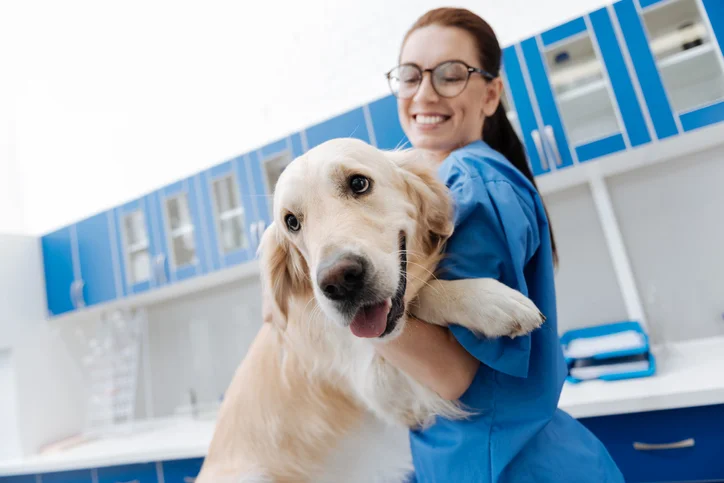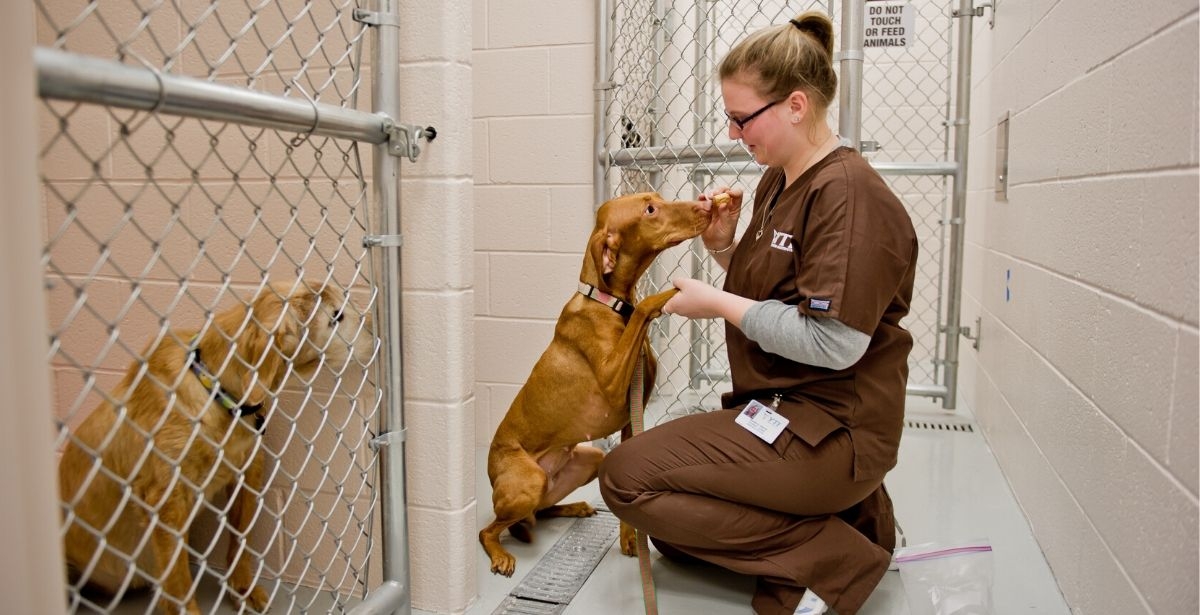Animal Care Technician: The Ultimate Guide to a Rewarding Career
An Animal Care Technician ensures the well-being of animals in various settings. They provide daily care, monitor health, and maintain cleanliness.
Animal Care Technicians play a vital role in maintaining animal health and welfare. These professionals handle feeding, grooming, and administering medications. They often work in veterinary clinics, research facilities, or animal shelters. Their responsibilities also include monitoring animal behavior and reporting any health issues to veterinarians.
A strong understanding of animal needs and behavior is essential. Animal Care Technicians must have good communication skills for interacting with pet owners and colleagues. This career requires both physical stamina and a compassionate nature. Proper training and certification can enhance job prospects in this fulfilling field.

Credit: www.ziprecruiter.com
Introduction To Animal Care Technicians
An Animal Care Technician plays a crucial role in animal welfare. They ensure animals receive the best care. These professionals work in various settings. They may work in animal shelters, research labs, or veterinary clinics. Their primary goal is to keep animals healthy and happy.
Role And Responsibilities
Animal Care Technicians have many duties. Here are some key responsibilities:
- Feeding and providing water to animals.
- Cleaning and maintaining animal habitats.
- Monitoring animal health and behavior.
- Administering medications and treatments.
- Assisting veterinarians during exams and procedures.
Importance In Animal Welfare
Animal Care Technicians are vital to animal welfare. They ensure animals are well-fed and comfortable. They identify health issues early. This helps in providing timely treatment. They also provide socialization, which is important for animal well-being.
| Role | Importance |
|---|---|
| Feeding and Watering | Ensures animals stay healthy |
| Cleaning Habitats | Prevents diseases |
| Monitoring Health | Early detection of issues |
| Administering Medications | Treats illnesses effectively |
| Socialization | Improves animal happiness |
Educational Requirements
Becoming an Animal Care Technician requires specific education. The field needs both knowledge and hands-on skills. Understanding the educational requirements is key to starting this career.
Necessary Qualifications
To work as an Animal Care Technician, you need a high school diploma. Most employers also prefer candidates with an associate degree or a certificate in animal science. Here are the basic qualifications:
- High school diploma or equivalent
- Associate degree in animal science or a related field
- Certification from recognized institutions
Some workplaces may offer on-the-job training. Still, having formal education gives you an edge.
Recommended Courses
Several courses can help prepare you for this role. These courses provide valuable skills and knowledge. Below is a table of recommended courses:
| Course Name | Description |
|---|---|
| Animal Biology | Learn about animal anatomy and physiology. |
| Veterinary Technology | Gain skills in animal care and medical procedures. |
| Animal Nutrition | Understand the dietary needs of different animals. |
| Lab Animal Science | Focus on the care of animals used in research. |
Taking these courses boosts your employability. They also prepare you for real-world challenges in animal care.
Skills And Attributes
An Animal Care Technician plays a vital role in ensuring animal well-being. They must possess a mix of technical and soft skills to excel in their duties. Below, we will explore the essential skills and attributes required for an Animal Care Technician.
Technical Skills
Technical skills are crucial for an Animal Care Technician. They ensure proper care and handling of animals. These skills include:
- Animal Handling: Safely and humanely managing animals.
- Medical Knowledge: Understanding basic animal anatomy and health issues.
- Laboratory Skills: Conducting tests and analyzing samples.
- Sanitation Practices: Maintaining a clean and safe environment.
- Record Keeping: Accurately documenting animal health and treatments.
Soft Skills
Soft skills are equally important for an Animal Care Technician. These skills help in building trust and communication. Key soft skills include:
- Empathy: Understanding and caring for animals’ emotional needs.
- Communication: Effectively conveying information to colleagues and pet owners.
- Patience: Handling animals and stressful situations calmly.
- Teamwork: Collaborating well with other staff members.
- Problem-Solving: Quickly addressing and resolving issues.
Typical Work Environment
An Animal Care Technician works in varied environments. Their job involves many tasks. Understanding the typical settings can help potential candidates.
Types Of Facilities
Animal Care Technicians work in different places. Each facility has its own needs and challenges. Here are some common types:
| Facility Type | Key Characteristics |
|---|---|
| Veterinary Clinics | Provide medical care, assist vets, handle pets. |
| Animal Shelters | Care for abandoned pets, clean kennels, assist in adoptions. |
| Research Labs | Maintain lab animals, ensure humane treatment, record data. |
| Zoos | Feed exotic animals, clean enclosures, educate visitors. |
Daily Routine
The daily routine of an Animal Care Technician is diverse. Here’s what a typical day might include:
- Morning Feeding: Start the day by feeding the animals.
- Health Checks: Check animals for signs of illness.
- Cleaning Duties: Clean cages, kennels, and work areas.
- Record Keeping: Update animal health and treatment records.
- Exercise: Ensure animals get exercise and social interaction.
- Medical Assistance: Assist vets with procedures and treatments.
Tasks can vary based on the facility. Each day brings new challenges and rewards. The job requires dedication and compassion.
Career Path And Opportunities
Choosing a career as an Animal Care Technician offers various opportunities for growth. This field is perfect for those passionate about animal welfare. Let’s explore the career path and opportunities available in this rewarding profession.
Entry-level Positions
Starting as an Animal Care Technician typically begins with entry-level roles. These positions often include:
- Animal Shelter Assistant
- Veterinary Assistant
- Lab Animal Caretaker
These roles provide hands-on experience with animal care. They often require basic knowledge of animal behavior and health.
Animal Shelter Assistants care for animals in shelters. They feed, clean, and monitor the animals’ health.
Veterinary Assistants support veterinarians. They help with procedures and care for animals during recovery.
Lab Animal Caretakers work in research facilities. They ensure lab animals are healthy and well-cared for.
Advancement Prospects
As an Animal Care Technician, there are many paths for advancement. Some of the potential roles include:
- Senior Animal Care Technician
- Animal Facility Manager
- Animal Behavior Specialist
Senior Animal Care Technicians oversee junior staff and ensure proper care standards. They often train new technicians and handle more complex tasks.
Animal Facility Managers are responsible for the overall operation of animal care facilities. They manage staff, budgets, and ensure the facility meets all regulations.
Animal Behavior Specialists focus on understanding and modifying animal behavior. They work with animals to address behavioral issues and improve their quality of life.
Each of these roles offers increased responsibility and the chance to make a bigger impact on animal welfare.
Continuing education and certification can further enhance career prospects. Many professionals pursue specialized training in areas like animal behavior, veterinary technology, or laboratory animal science.
Overall, the career path of an Animal Care Technician is both fulfilling and diverse. It offers many opportunities to grow and make a difference in the lives of animals.

Credit: personnel.lacity.gov
Challenges And Rewards
Being an Animal Care Technician is a unique and fulfilling job. This career path has its own set of challenges and rewards. Understanding these can help you appreciate the role better.
Common Challenges
Animal Care Technicians face many challenges in their daily work. Here are some common ones:
- Emotional Stress: Caring for sick animals can be emotionally taxing.
- Physical Demands: The job requires lifting, bending, and long hours standing.
- Exposure to Hazards: They often work with chemicals and sharp instruments.
- Irregular Hours: Animal care often requires weekend and holiday shifts.
Key Rewards
Despite the challenges, there are many rewards in this career:
- Job Satisfaction: Helping animals recover brings immense joy.
- Learning Opportunities: The job offers ongoing learning and skill development.
- Team Environment: Working with a dedicated team can be very fulfilling.
- Making a Difference: Your work directly impacts animal welfare.
| Challenges | Rewards |
|---|---|
| Emotional Stress | Job Satisfaction |
| Physical Demands | Learning Opportunities |
| Exposure to Hazards | Team Environment |
| Irregular Hours | Making a Difference |
Certifications And Professional Development
Animal Care Technicians play a crucial role in ensuring the health and well-being of animals. To excel in this field, obtaining relevant certifications and engaging in professional development is essential. Certifications verify your expertise, while continuous learning keeps you updated. This section explores key certification programs and opportunities for continuing education.
Certification Programs
Several certification programs are available for Animal Care Technicians. These certifications validate your skills and knowledge in animal care.
| Certification | Issuing Organization | Requirements |
|---|---|---|
| Certified Veterinary Technician (CVT) | American Veterinary Medical Association (AVMA) | Completion of an accredited veterinary technology program |
| Laboratory Animal Technician (LAT) | American Association for Laboratory Animal Science (AALAS) | Work experience and passing the LAT exam |
| Animal Care Certified (ACC) | National Animal Care & Control Association (NACA) | Completion of NACA courses and passing the exam |
Continuing Education
Continuing education is vital for staying current in the field. It helps you learn new techniques and adapt to industry changes. Here are some options:
- Workshops and Seminars: Attend industry-specific workshops and seminars to gain hands-on experience.
- Online Courses: Enroll in online courses related to animal care and veterinary technology.
- Professional Conferences: Participate in conferences to network and learn from experts.
- Journals and Publications: Subscribe to veterinary journals to stay updated on the latest research.
Engaging in these activities will enhance your skills and keep you informed. This commitment to learning sets you apart as a dedicated Animal Care Technician.
Job Market And Salary Expectations
The role of an Animal Care Technician is crucial for the well-being of animals in various settings. From vet clinics to research labs, these professionals ensure animals are healthy and happy. Understanding the job market and salary expectations can help you decide if this career is right for you.
Current Job Market
The demand for Animal Care Technicians is on the rise. Many industries require skilled individuals to care for animals. Vet clinics, research labs, and animal shelters are the primary employers. This growing need offers a stable job market for aspiring technicians.
According to recent data, there are more job openings now than ever before. This trend is expected to continue, making it an excellent time to pursue this career.
Salary Ranges
The salary of an Animal Care Technician varies by location and experience. Here is a general overview of what you can expect:
| Experience Level | Average Salary |
|---|---|
| Entry Level | $25,000 – $30,000 per year |
| Mid-Level | $30,000 – $40,000 per year |
| Senior Level | $40,000 – $50,000 per year |
Geographical location also plays a significant role in salary. Urban areas often offer higher wages due to the cost of living. Here are some examples:
- New York City: $35,000 – $50,000 per year
- Los Angeles: $30,000 – $45,000 per year
- Chicago: $28,000 – $42,000 per year
Additional benefits may include health insurance, paid time off, and opportunities for advancement. These perks add value to the overall compensation package.
Tips For Aspiring Animal Care Technicians
Becoming an Animal Care Technician is a rewarding career. It involves working closely with animals and ensuring their well-being. If you aspire to be an Animal Care Technician, follow these essential tips to kickstart your journey.
Gaining Experience
Hands-on experience is crucial for aspiring Animal Care Technicians. Seek volunteer opportunities at local shelters, veterinary clinics, or zoos. These experiences help you understand animal behavior and care routines. Additionally, internships provide invaluable insights and professional connections.
| Experience Type | Description |
|---|---|
| Volunteer Work | Assist with daily animal care tasks at shelters. |
| Internships | Work under supervision in veterinary clinics or zoos. |
| Pet Sitting | Care for pets in their homes while owners are away. |
Networking
Building a network is vital for career growth. Join professional organizations related to animal care. Attend industry conferences and seminars to meet experienced technicians and veterinarians. Engage in online forums and social media groups dedicated to animal care professionals. Networking opens doors to job opportunities and mentorships.
- Join professional organizations
- Attend industry events
- Engage in online forums
Remember, persistence and dedication are key. Stay passionate and keep learning. Your dream of becoming an Animal Care Technician is within reach.

Credit: yti.edu
Frequently Asked Questions
What Does An Animal Care Technician Do?
An Animal Care Technician ensures animals are healthy and comfortable.
What Qualifications Are Needed?
Typically, a high school diploma and animal care experience are required.
Is Certification Necessary?
Certification is beneficial but not always mandatory.
What Skills Are Essential?
Compassion, attention to detail, and physical stamina are essential skills.
Where Do Animal Care Technicians Work?
They work in shelters, veterinary clinics, and research facilities.
How Much Does An Animal Care Technician Earn?
Salaries vary but average around $28,000 per year.
Are There Growth Opportunities?
Yes, experienced technicians can move into supervisory roles.
What Are The Daily Tasks?
Tasks include feeding, grooming, and monitoring animal health.
How To Become An Animal Care Technician?
Gain experience, pursue relevant education, and consider certification.
What Is The Job Outlook?
The demand for Animal Care Technicians is expected to grow.
Conclusion
Becoming an Animal Care Technician offers a fulfilling career path. You’ll help animals and gain valuable skills. This role provides a unique opportunity to make a difference. Consider this career if you love animals and want to contribute to their well-being.
Start your journey today and make an impact in animal care.


![Do Tigers Roar? [Yes! Here’S Why]](https://proanimalguide.com/wp-content/uploads/2022/11/7d74e947e80d497c9412239e3eb18c14-768x440.jpg)


![What Eats a Vulture? [List of Vulture Predators]](https://proanimalguide.com/wp-content/uploads/2022/12/38b8a696beea424c8c083c3bc8a0de92-768x461.jpg)
